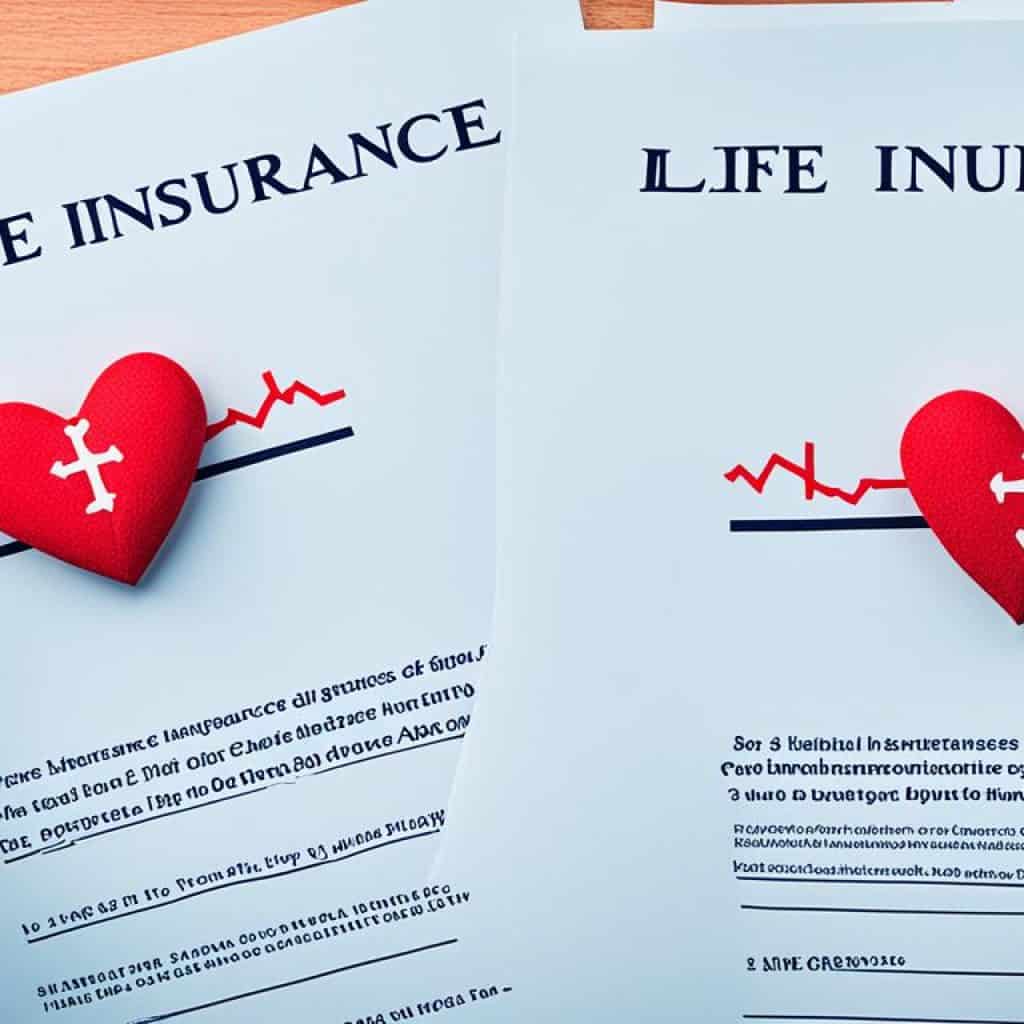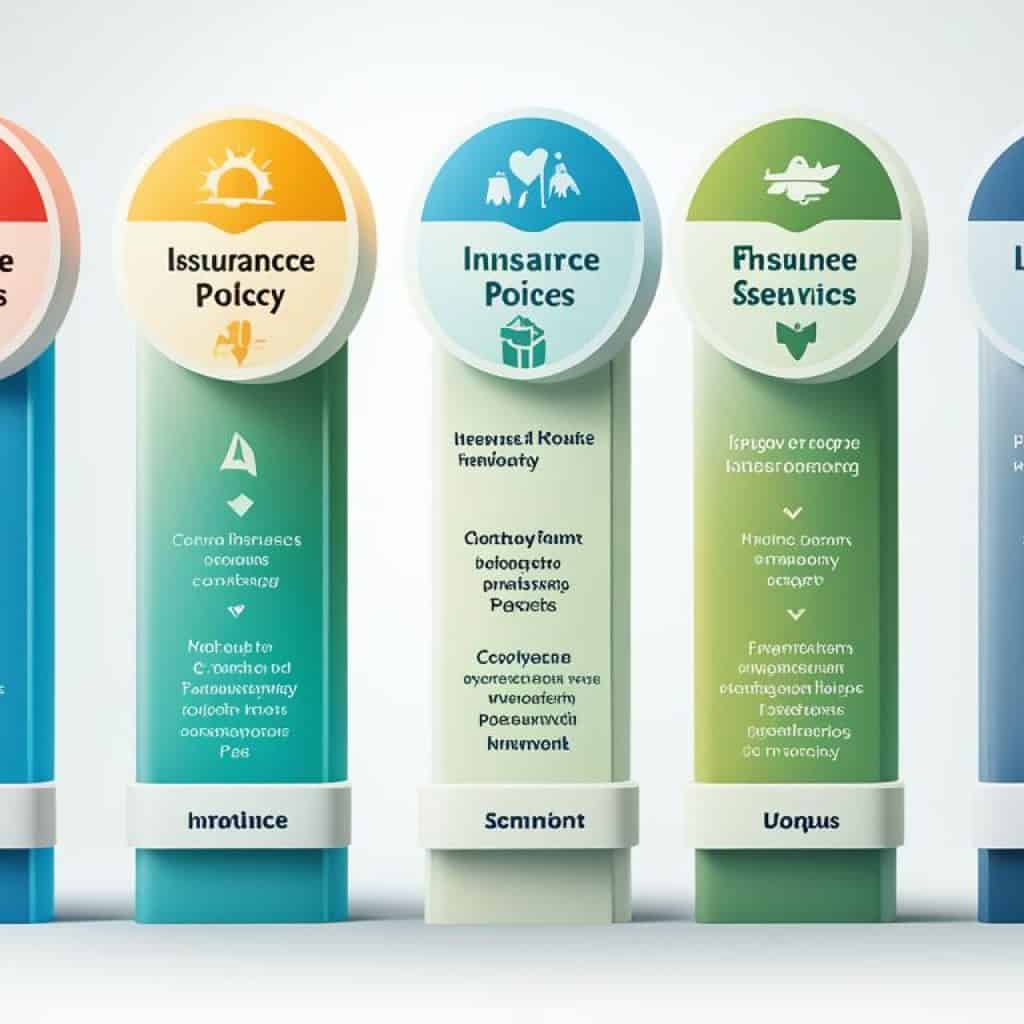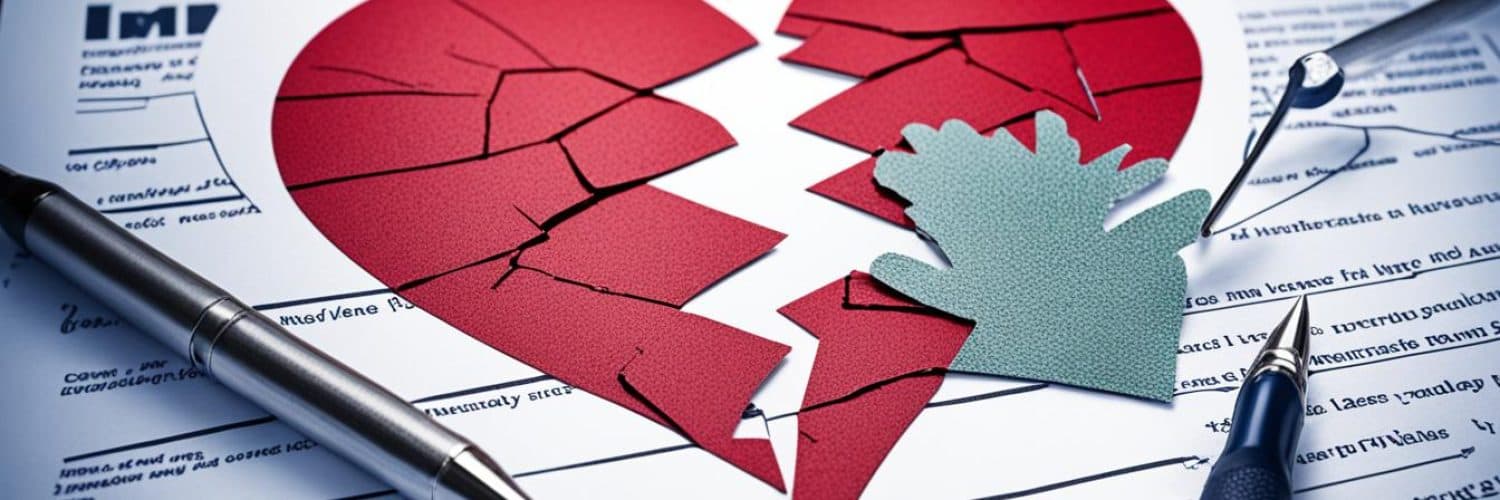Going through a divorce is tough. It’s full of legal and financial challenges. Making sure your life insurance is updated is key to protecting your loved ones financially.
Many of us have been through divorce or seen it happen to someone close. It’s emotionally tough and complex1. When you’re figuring out your divorce details, remember to update your life insurance. Your divorce agreement will decide who gets what, including your insurance2. A good lawyer and financial advisor can help keep you safe financially during this time.
Key Takeaways
- Review and update your life insurance beneficiaries as part of your divorce process.
- Understand how your divorce settlement impacts the ownership, coverage, and premium responsibilities of your life insurance policy.
- Consider the role of life insurance in providing financial support for your children after a divorce.
- Be aware of the potential impact of life insurance cash value in the equitable distribution of marital assets.
- Ensure your life insurance coverage adequately protects your family’s financial future.
Understanding Life Insurance After Divorce
Going through a divorce can raise many questions about your life insurance policy. Can you keep your policy? Who pays the premiums now? What happens to your beneficiary? These questions are key to keeping your finances safe and your kids secure after the split3.
Common Questions About Life Insurance and Divorce
First off, some states remove your ex-spouse as a beneficiary after a divorce3. Most U.S. courts won’t let you keep a policy on an ex3. Usually, parents pick their kids as new beneficiaries after a divorce3.
Another big question is who pays for the life insurance. Sometimes, the divorce settlement makes the higher earner keep a policy and pay premiums to support the family if they pass away3. The court might also split the cash value of whole life policies in the divorce3.
The Role of Life Insurance in Divorce Settlements
Life insurance is crucial for your financial safety after a divorce, especially with kids. Alimony and child support aren’t always steady, so life insurance can help your kids if you’re not there3. Divorce settlements might make the higher earner keep life insurance for family support if they die early3.
Single parents should also consider life insurance to support their kids if they pass away too soon3. The coverage amount is usually your yearly income times the years until your child grows up3. Keeping life insurance for both exes helps protect your kids and helps with any financial issues either parent might face3.
Knowing the basics and the role of life insurance in divorce helps you make smart choices for your coverage. This way, you can keep your family’s financial future safe345.
Court-Ordered Life Insurance in Divorce
Life insurance isn’t always needed in divorce settlements. But, it’s key in cases involving child support or alimony. Courts might order it to protect the finances of those who depend on the insured’s income6.
When Can Courts Require Life Insurance Coverage?
In child support cases, courts often say the ex-spouse must keep life insurance until the kids grow up. This is usually between 18 to 21 years old, based on state laws6. For alimony, how long the insurance is needed depends on how long the alimony lasts, which varies by state6.
Life insurance with many beneficiaries secures the finances of those depending on the insured. But, for minors, it gets tricky. They might need a court-appointed guardian to handle the money6.
- Court-ordered life insurance is often needed in divorce for child support or alimony6.
- In child support cases, the ex-spouse keeps life insurance until all kids are grown (18 or 21, based on state laws)6.
- For alimony, how long coverage lasts depends on the length of alimony payments, which varies by state6.
- Life insurance policies can have many beneficiaries to protect those depending on the insured6.
- Life insurance for minors can be complex, needing a court-appointed guardian to manage the funds6.
Getting court-ordered life insurance means following the court’s rules, like meeting policy needs and deadlines6. Applying for life insurance can take 4-6 weeks. So, it’s key to start early to avoid delays or issues6. Some insurers offer quick approval, which helps those needing coverage fast because of court orders6.
After meeting court-ordered life insurance duties, people might keep the policy for more protection or change beneficiaries as needed6.
Ownership and Payment Responsibility
Life insurance after divorce can be tricky. Your divorce decree will say who owns the policy, who it covers, and who pays for it7. The settlement decides who owns it, and if someone doesn’t pay the premiums, it’s a big problem7.
Permanent life insurance, like whole or universal, is seen as a marital asset because it has cash value8. Term life insurance doesn’t have cash value, so it’s not seen as an asset in divorce8. Sometimes, you can give a life insurance policy to an ex, but laws in most states don’t let you keep it on them unless there’s a reason like alimony8.
After a divorce, you might need to change your life insurance policy or who it covers8. This could happen if your financial situation changes, like if you have to pay child support or alimony78.
| Life Insurance Type | Marital Asset Consideration |
|---|---|
| Permanent (Whole, Universal) | Considered a marital asset due to cash value component |
| Term | Not typically considered a marital asset |
If you have to pay child support or alimony, the court might say you need life insurance7. Experts like Chris Chen suggest checking your life insurance needs after a divorce, especially if you have kids and need to save for college7.
Handling life insurance after a divorce can be complicated. But, if you understand your divorce decree and get help from a financial expert, you can make sure you have the right coverage for your new life78.
Handling the Cash Value of Permanent Life Insurance
During a divorce, many forget about the cash value in their permanent life insurance policies. But, this can be a big part of dividing what you own together9. The cash value part of these policies is part of what you own and might need to be split when you divorce9.
Courts might ask for the cash value of your life insurance, and then split it between you and your ex9. Policies like whole or universal life build up cash value over time. This cash is seen as an asset when you’re getting divorced9.
Dealing with life insurance cash value can be tricky. You need to know the policy details, its current cash value, and what happens if you split it9. It’s important to work with a financial advisor and a divorce lawyer to make sure it’s divided right and protects you9.
| Type of Life Insurance | Cash Value Consideration |
|---|---|
| Permanent Life Insurance (e.g., Whole Life, Universal Life) | Cash value is considered a marital asset and may need to be divided during divorce. |
| Term Life Insurance | Does not have a cash value component and is not considered a marital asset. |
The court might also tell you to keep life insurance to cover alimony or child support9. This usually means getting a term life insurance policy that stays in place until your kids can support themselves9.
Good planning and talking with your ex and your legal and financial advisors can help manage your life insurance cash value during divorce9. Knowing what’s involved and taking steps can protect your money and make sure assets are divided fairly9.
Updating Beneficiary Designations
After a divorce, it’s key to check and update your life insurance beneficiary names. Most life insurance policies let you change the person who gets the money10. But, some policies have irrevocable beneficiaries who can’t be changed without their okay, often in divorce situations10.
Knowing the difference between revocable and irrevocable beneficiaries is important. It affects how you can change your life insurance after a divorce10. If you don’t update your beneficiaries, your ex might get the life insurance money or retirement savings, which might not be what you wanted10.
Life events like getting remarried after a divorce mean you should look at your beneficiary names again10. Keeping your beneficiary info up to date helps make sure your assets go where you want them to. It also helps avoid legal issues for your family10.
Reviewing Revocable and Irrevocable Beneficiaries
Life insurance has two kinds of beneficiaries: revocable and irrevocable. Revocable ones can be changed by you anytime, but irrevocable ones need the beneficiary’s okay to change10. Knowing what kind you have is key after a divorce, as it affects how you can change your life insurance10.
| Beneficiary Type | Changeability | Divorce Impact |
|---|---|---|
| Revocable | Policy owner can change at any time | Easier to update after divorce |
| Irrevocable | Requires beneficiary’s consent to change | More difficult to update after divorce |
Understanding revocable and irrevocable beneficiaries helps you update your life insurance after a divorce10. This ensures your assets go where you want and avoids legal issues10.
“Reexamining and updating beneficiary designations should be a regular practice throughout an individual’s lifetime to avoid complications and ensure the desired distribution of assets.”
Regularly checking and updating your life insurance beneficiaries keeps your family safe and avoids problems after a divorce10. By knowing about the different types of beneficiaries and how divorce affects them, you can make smart choices about your life insurance101112.
Protecting Your Children’s Financial Future
After a divorce, you might need to update your life insurance to change beneficiaries and adjust your finances13. If you have kids, it’s key to keep their financial security safe, even after you’re divorced.
Consider changing the beneficiary from your ex to your kids. This is a big part of your divorce plan, making sure your kids are looked after if you pass away13. Keeping life insurance on yourself can be a safety net for your kids until they grow up. This is especially true if your ex doesn’t help with their support anymore13.
When picking your kids as beneficiaries, think about the details and taxes involved13. Naming them can be cheap but might mean less control over the money13. Using a trust for the insurance money gives you more control but costs more and might leave less for your kids13.
Choosing life insurance in a trust for your child gives you the most control, but it’s the pricier option13. It’s wise to talk to financial experts to find the best plan after your divorce13.
Looking out for your kids’ financial future is crucial during and after your divorce. By thinking about your life insurance and making the right changes, you can help keep them safe and secure through big changes13.
“It’s a substantial conversation among many of my clients who are parents, indicating a prevalent concern in the community.”14 – Jason Niell, national trust administration manager for City National Bank Trust and Estates
Parents often want to protect things like jewelry, art, and family homes for their kids, showing how important these items are in inheritance14. Trusts are a common way for parents to keep their family’s wealth safe, showing how many families use them for their kids’ financial security14.
Trusts can cover different needs like health, education, and support, making them flexible for various situations14. It’s best to get a lawyer to set up trusts, highlighting the need for expert advice in planning for your children’s future14.
Talking to your kids about your plans to protect their inheritance is key, ensuring they understand and accept the steps you’re taking14.
Not many people like to talk about life insurance during mediation, but it’s important for protecting the finances of divorcing couples and their kids15. Custodial parents might buy life insurance on non-custodial parents, usually term insurance until the kids turn 18 or graduate15.
Changing the ownership and who gets the money in life insurance policies is an option after a divorce15. Non-custodial parents might keep their policies or buy new ones with their ex as the owner and beneficiary15. Before talking about changing policies, gather info like the type, cost, and cash value15.
Tell the insurance company about any changes in who gets the money, and don’t use wills for this15. Naming minor kids as beneficiaries can cause problems, possibly needing a trust to manage the money15.
Life insurance can be a way to protect your kids’ financial needs during a divorce, making sure they have support and security15. Who you choose as a beneficiary depends on your situation15. You can change who gets the money in life insurance after a divorce, but it must fit your divorce agreement. Some places might automatically take away your ex’s right to the money15.
Not updating your life insurance after a divorce could mean your ex gets the money, causing problems with other family members15. It’s important to update your legal documents, including life insurance, after big life changes like a divorce151314.
life insurance after divorce
When you’re rearranging your finances after a divorce, think about your life insurance too. Make sure to update your contact info, check your beneficiaries, and review your policies. This ensures they still meet your needs3.
Your life insurance needs might change a lot after a divorce. In the U.S., courts usually don’t let you keep a life insurance policy on an ex3. Some states also change your spouse’s status as a beneficiary after a divorce3. It’s important to update your beneficiaries to match your new goals and priorities.
Term life insurance isn’t usually seen as a marital asset in divorce settlements16. But, the cash value of whole life insurance policies might be divided16. Sometimes, courts ask the working spouse to keep life insurance to support the kids3.
Dealing with life insurance after a divorce can be tricky. But, it’s key for your and your kids’ financial health. Review your policies, update your beneficiaries, and think about what you need now. This way, you can protect your family’s future16.
Life insurance is crucial for your kids’ financial security after a divorce3. Plan your coverage based on their needs. This helps ensure their well-being and gives you peace of mind31617.
Reviewing Existing Life Insurance Policies
Going through a divorce means you need to check your life insurance policies. These policies might have been set up during your marriage and now need updates for your new situation18. It’s important to know the terms, benefits, and limits of your current coverage18.
Some policies cover both spouses and pay out when the first spouse dies or after both spouses pass away1. Others have a joint tenancy, where both own the policy equally and must agree on changes18. Looking into these details helps you figure out what to do with your life insurance next.
Most life insurance policies can be changed by the owner, like updating the beneficiary at any time.18 But, sometimes an irrevocable beneficiary is chosen, often after a divorce, needing the beneficiary’s okay for changes18.
It’s a good idea to thoroughly review and update your policies after a divorce18. This ensures your life insurance matches your new financial situation and keeps your kids safe18.
| Key Considerations for Reviewing Existing Life Insurance Policies After Divorce |
|---|
|
Reviewing your life insurance policies carefully helps you make smart choices about your coverage18. This ensures it fits your new financial needs and family duties18. Taking this step gives you peace of mind and safeguards your loved ones during this change18119.
Options for Handling Joint Life Insurance Contracts
Going through a divorce means you and your ex might have a joint life insurance contract. You have a few ways to handle this policy, each with its own pros and cons20. It’s key to think about what’s best for you and talk to a financial advisor or lawyer.
One way is for one spouse to keep the life insurance. This keeps the policy active, and the keeping spouse pays the premiums20. Or, you could end the joint policy, which stops coverage but might give a cash value to split in the divorce.
You and your ex could also switch the policy’s ownership to one person. This means changing who owns the policy and who gets the money if someone dies20. This is good if one spouse wants to keep coverage for themselves or your kids.
Lastly, you and your ex could keep the joint policy but change who gets the money if someone dies. This keeps the policy but updates who gets the benefits, possibly leaving out your ex20.
No matter what you decide, make sure to check your life insurance policies and update them as needed. This ensures they match your new financial goals and protect your family’s future20.

Remember, the choices you make about your joint life insurance can affect your finances for a long time. So, think carefully and get professional advice20. By understanding your options and making smart choices, you can make the transition smoother and keep your family’s finances safe during tough times.
Determining if Life Insurance is a Marital Asset
When you’re getting a divorce, you’ll need to look at your assets like bank accounts and life insurance. Life insurance can be seen as a marital asset if it has cash value, like whole life insurance21. This cash value can be split or traded for other assets during divorce21.
Under Illinois law 750 ILCS 5/503, life insurance policies are seen as marital property21. After a divorce, it’s important to update who gets the life insurance benefits21.
If your ex is paying spousal support or child support, you might want to add life insurance to cover these costs21. But, naming kids as beneficiaries isn’t always a good idea if they’re minors. Life insurance companies can’t pay out to kids yet21. Instead, you could set up a trust or name your ex as the beneficiary if you share custody and money duties21.
Deciding on life insurance in a divorce can be tricky. It’s key to talk to your divorce lawyer to understand your state’s laws and protect your rights. Looking at your life insurance policies is a big part of the divorce process1.
Navigating Life Insurance During Separation
Going through a separation means you need to think about your life insurance. Even if you and your spouse don’t live together anymore, you might still have shared bills like a mortgage or debts22. Keeping your life insurance active can make sure these bills are paid if something unexpected happens.
It’s smart to talk to a lawyer and a financial advisor during this time22. They can help you understand the legal and financial parts of your situation. This way, you can make smart choices about your insurance.
- Learn how the court might make you keep your life insurance policy and name your kids as beneficiaries22. This is sometimes part of a child support order.
- Remember, the cash value of your life insurance could be split in the divorce22.
- Check who you’ve named as your beneficiaries and update them if needed22. This makes sure your loved ones are looked after.
Handling life insurance during a separation can be tricky, but with the right advice and planning, you can keep your coverage2324. This way, you protect your loved ones and meet your financial duties.
Risks of Not Updating Life Insurance After Divorce
After a divorce, your life changes a lot, including your need to update your life insurance and estate plan. Even if you and your ex get along, not updating your life insurance can lead to big problems25.
Life insurance is a deal between you and the company. The person you name as a beneficiary gets the money if you die. If you don’t change your policy after a divorce, your ex might still get the money, even if you don’t want them to25.
In some places, getting a divorce can take away your ex as the main person who gets the policy money26. This means if you don’t change your policy, the money could go through probate. This can cause delays and problems in getting the money to your new chosen people.
Term life insurance is often forgotten during a divorce because it doesn’t have cash value26. So, your ex might still be the one who gets the money, even if you don’t want them to.
If you have kids, it’s very important to check and update your life insurance to keep them safe1. Having a policy that covers child support or alimony until your kids grow up can help them financially.
Not updating your life insurance after a divorce can cause big problems and disagreements26. It’s smart to talk to divorce lawyers and experts to understand how life insurance works during and after a divorce.
Life insurance is a key part of your estate plan. Keeping it current is crucial to protect your family and make sure your wishes are followed. Reviewing and updating your life insurance after a divorce helps avoid the dangers of not doing so.
Selecting New Life Insurance After Divorce
After a divorce, it’s key to look at your life insurance needs again. Your financial situation has changed, so you need to pick life insurance that fits your new goals. Choosing new life insurance after a means thinking about what you need now and in the future.
Considering Term, Whole, Universal, and Variable Universal Life
When looking at life insurance after a divorce, you have a few options:
- Term life insurance is good for temporary needs like child support or alimony.
- Whole life insurance and universal life insurance give permanent coverage and a cash value that can help during divorce2.
- Variable universal life mixes permanent coverage with a cash value that can grow1.
When you’re rebuilding your life insurance after a divorce, think about what you need now and what you might need later. Make sure the premiums fit your new budget27.
| Life Insurance Type | Key Features | Potential Advantages |
|---|---|---|
| Term Life Insurance | Temporary coverage, no cash value | Affordable premiums, meet immediate needs |
| Whole Life Insurance | Permanent coverage, cash value accumulation | Lifelong protection, potential cash value growth |
| Universal Life Insurance | Permanent coverage, flexible premiums, cash value | Adaptable to changing needs, cash value accumulation |
| Variable Universal Life | Permanent coverage, cash value invested in subaccounts | Potential for cash value growth, investment opportunities |
Finding the right life insurance after a divorce can be tough. But, by thinking about what you need, you can find coverage that protects your financial future and your loved ones.

“Rebuilding your life insurance portfolio after a divorce requires thoughtful planning to ensure you have the right coverage in place to meet your evolving needs and protect your loved ones.”
Conclusion
Dealing with life insurance during and after a divorce can be tricky. Yet, it’s key for protecting your financial future. Knowing your options helps make sure your life insurance keeps giving the right support to you and your family28.
If you need to change who gets your policy or check your coverage, getting help from a financial advisor is smart. They can guide you through the process. This way, you can avoid mistakes like not updating your policy or counting too much on group plans28.
Your life insurance is a big part of your financial plan. Making smart choices can give you peace of mind and financial security. By updating your life insurance after a divorce, you keep your loved ones safe and secure your financial future293028.
FAQ
Can I keep my life insurance after my divorce?
How does my divorce affect the beneficiary of my life insurance policy?
Who will pay the premium for my insurance policy after the divorce?
Do I have the right amount of life insurance, or the right type of life insurance?
Can the court require me or my ex-spouse to maintain life insurance coverage?
What happens if my ex-spouse doesn’t pay the life insurance premiums as required by the divorce decree?
How does the cash value of a permanent life insurance policy get divided in a divorce?
Can I change the beneficiary of my life insurance policy from my ex-spouse to my children?
What options do I have for handling a joint life insurance contract after a divorce?
Is life insurance considered a marital asset in a divorce?
Source Links
- https://www.investopedia.com/articles/personal-finance/112515/how-life-insurance-works-divorce.asp
- https://www.protective.com/learn/life-insurance-after-divorce
- https://www.trustage.com/learn/life-events/divorce-life-insurance
- https://www.quickquote.com/life-insurance-after-divorce/
- https://www.riskquoter.com/blog/divorce/
- https://www.quotacy.com/do-you-need-court-ordered-life-insurance/
- https://www.forbes.com/advisor/life-insurance/divorce/
- https://www.aflac.com/resources/life-insurance/life-insurance-during-and-after-a-divorce.aspx
- https://www.quotacy.com/life-insurance-after-a-divorce/
- https://www.jaburgwilk.com/news-publications/why-beneficiary-designations-should-be-updated-after-divorce
- https://www.aflac.com/resources/life-insurance/life-insurance-beneficiary-rules-after-a-divorce.aspx
- https://havenlife.com/blog/life-insurance-beneficiary-rules-after-divorce/
- https://www.allegacy.org/smart-blog/what-effect-does-divorce-have-on-life-insurance/
- https://www.cnb.com/personal-banking/insights/how-to-protect-your-childs-inheritance.html
- https://www.greatlakesdfs.com/blog/life-insurance-and-divorce
- https://www.policyadvisor.com/life-insurance/life-insurance-and-divorce-settlements/
- https://www.mcclure-lawgroup.com/blog/life-insurance-and-texas-divorce/
- https://www.usaa.com/inet/wc/advice-insurance-life-insurance-after-divorce
- https://www.policygenius.com/life-insurance/life-insurance-and-divorce/
- https://www.havenlife.com/blog/life-insurance-beneficiary-rules-after-divorce/
- https://www.beermannlaw.com/practice-areas/divorce/life-insurance-in-divorce/
- https://shoun.com/firm-publications/life-insurance-after-divorce/
- https://www.charlesullman.com/divorce-lawyer/override-named-beneficiary
- https://www.insurancecentermo.com/resources/blog/what-happens-to-insurance-in-a-divorce/
- https://www.racinelaw.net/life-insurance-and-divorce-the-law-of-unintended-consequences.html
- https://myfamilylifeinsurance.com/2024/01/01/life-insurance-divorce/
- https://www.ailife.com/articles/life-insurance-after-a-divorce.html
- https://www.probusinsurance.com/life-insurance/life-articles/what-happens-to-your-life-insurance-policy-after-divorce/
- https://www.kotaklife.com/insurance-guide/about-life-insurance/what-happens-to-joint-life-insurance-after-divorce
- https://www.cgalaw.com/life-insurance-beneficiaries-and-divorce/







Add comment